|
You Don’t Know How Lucky You Are, Boys: Back in The U.S.S.R. 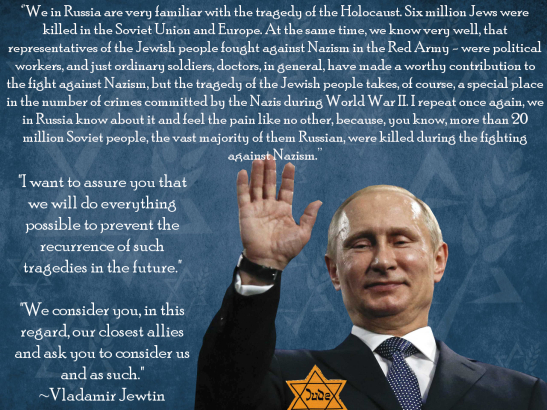 BMan BMan: We know he isn’t on “our” side because if he isn’t outright jewish, he serves them. Putin is the foil in the Kabuki. One side says he never stops his evil attacks on American values, while the other side worships him as if he is George Washington. Syria is just the latest act. Ukraine was first when the “other side” was represented by a Mulatto. “You Don’t Know How Lucky You Are, Boys”
Ayrian Skynet, 8 March 2018:
For most of a century, the partisans of the Soviet Union would make great bales of propaganda hay out of the treatment of blacks in the USA and other capitalist countries. Communism, contrarily, favored the black man’s liberation from his white colonialist oppressors – or so the story went. Many blacks around the world would find themselves seduced by various Marxist philosophies. W.E.B. DuBois, while wary of perceived racism within the Communist Party USA, looked to Russia as “the most promising modern country”1. Paul Robeson, too, professed “warm feelings of friendship for the peoples of that land”2. The Soviet Union provided military aid to multiple African nationalist movements during the Cold War, seeming to bolster its image as the ideological alternative to American racism – but had prejudice really been eradicated from the heart of the New Soviet Man of the Bright, Shining Socialist Future? Andrew Young, U.S. Ambassador to the United Nations under President Carter, averred, “The worst racists in the world are the Russians.”3 Soviet support of black nationalists fighting the Apartheid government of South Africa, for example, would seem to support the sincerity of the Communist Party’s public abhorrence for racism – but how did the Russians react when Africans were actually in their midst?
In 1959, at the urging of DuBois, Khrushchev established the Soviet Union’s Africa Institute to promote academic fellowship, and during the 1960s the number of Africans studying in the U.S.S.R. would swell. “As these institutional initiatives were being finalized African students began to trickle into the U.S.S.R.,” writes Maxim Matusevich: As of January 1, 1959, there were only seven students from sub-Saharan Africa officially enrolled in Soviet institutions of higher learning. However, between 1960 and 61 the number of African students in the USSR increased almost ten-fold, from 72 to over 500, eventually reaching some 5,000 by the end of the decade. […]
Despite the prevailing climate of complacency and the general timidity of their Soviet peers, Africans protested vociferously against poor living conditions, racist incidents, restrictions on travel within the U.S.S.R., restrictions on dating Russian girls, and restrictions on forming national and ethnic student associations. As early as March 1960, African students in Moscow petitioned the Soviet government to curb the expressions of crude racism by Soviet citizens. On another occasion, two African students refused to be part of a long established Soviet practice – an annual dispatch of thousands of Soviet students to work in the countryside during the harvest. The objectors from Chad and Morocco argued (unconvincingly and probably mockingly) that in their cultures men under 25 years old were not allowed to work in the fields but rather had a special obligation “to engage in leisure activities.” At about the same time four African students […] were expelled from Moscow State University for defying an administrative ban on the Black African Students’ Union. Their expulsion and subsequent departure from the country received wide coverage in the Western press. The students publicly accused university officials of suppressing the union as well as of imposing severe restrictions on the circulation of “books and jazz records.” […]
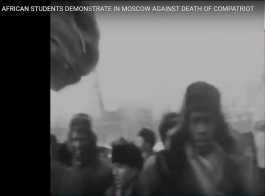 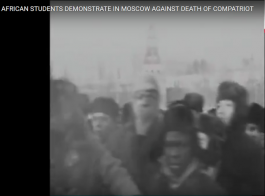 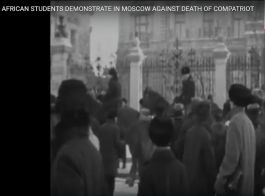
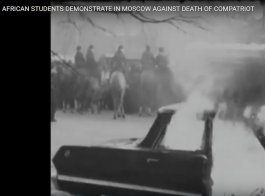 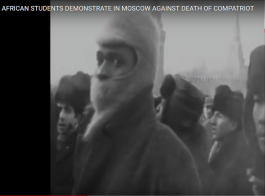 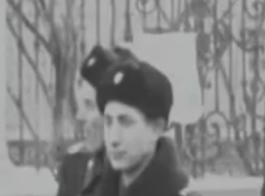
Darned if the Russian in the lower right corner doesn’t look like a young Putin.
The death of a Ghanaian student in Moscow, in December 1963, which his friends suspected to have been a homicide, occasioned an exceptionally angry reaction among African students in the U.S.S.R. They staged a protest march on the Kremlin [and appear to have set fire to at least one car in the process, judging by Associated Press archival footage] demanding a Bill of Rights for African students in the country […] More trouble brewed in 1964 and 1965, with African students in the U.S.S.R. frequently reporting racist attacks, fights with Soviet youngsters, and even feeling compelled to carry knives for protection. Komsomol officials at Moscow State University (MGU) grudgingly acknowledged several instances of scandalous behavior exhibited by Soviet students but also argued that Africans and other foreigners at MGU had a limited understanding of the selfless and romantic nature of Soviet young men, many of whom preferred the hardship of toil in remote Siberia to the pleasures of Moscow high life. One wonders if it was the “romantic nature of Soviet young men” that fueled the passions of one youthful geography major who threatened to “lynch” an African student married to his Russian fellow student. Or was it a disagreement over their respective work ethics that led another MGU freshman to call upon his African roommate to “pack up his stuff and go back to Mali”?
In May 1965, the Soviet authorities tacitly linked the African student community in the country with the idea of political subversion when they expelled a black American diplomat, Norris Garnett, for “conducting anti-Soviet work among students from African countries.” Garnett’s departure from the scene hardly had the desired long-term effect. Just a few years later, 800 African students went on a week-long strike, this time – in Kiev, in protest against the expulsion of a 23-year-old Czechoslovakian woman for marrying a Nigerian fellow-student. That same year a Nigerian student sleeping in his dorm room in the city of Lvov (L’viv) was attacked by “a drunken Russian with a chisel.” The attacker was reportedly incensed by the Nigerian’s successes with Russian and Ukrainian girls. The incident quickly turned into a major fight involving other Nigerian students who had come to the rescue of their compatriot, and as a result three of them were expelled “for attacking and beating up a Soviet citizen.” Discrimination or alleged discrimination aside, the students’ resentment, it was noted, stemmed from “the sole fact of their living in a communist country.” Once in the Soviet Union, Africans, “even self-proclaimed leftists,” had to reconcile “the obvious discrepancies between what is said and what actually exists.” And what “actually existed” in the Moscow of 1960s and 70s were “the crowded living conditions, lack of privacy, monotonous diet, inadequate sanitary facilities, and the overall drabness of life.” A former African student at Moscow State University, writing about his experiences there, maintained that of all foreign students in the Soviet Union, Africans were most upset by Russia’s depressed style of living […]
There was “no splash of color to relieve Moscow’s damp gray”4, and the Russian cultural diet of the time was famously lacking in the urban flava to which blacks are known to be partial. Kidding aside, Soviets’ blacks appear to have quickly fallen into a pattern of obnoxious behavior that will be immediately familiar to American readers: lazing, complaining, chasing white girls, getting into fights – constituting a demographic liability and a constant threat to public order – all while blaming crazed, irrationally hateful whites for their problems.
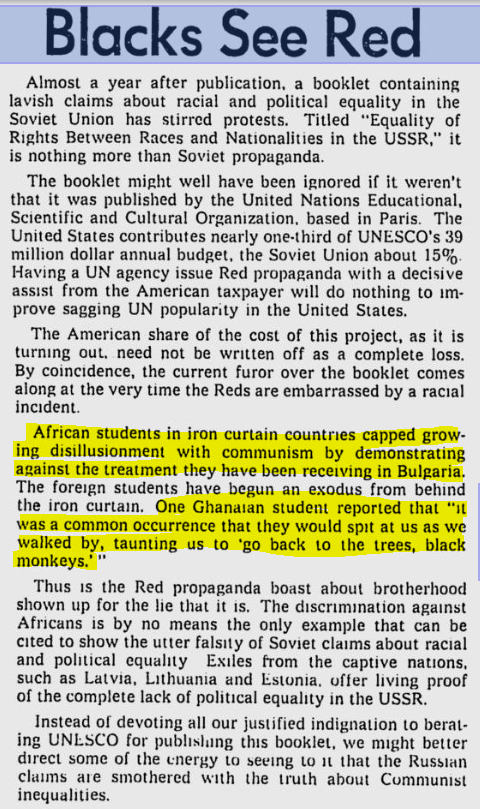
This story, which appeared in The Milwaukee Sentinel on Feb 19 1963, indicates that anti-black sentiment in the communist bloc was not limited to Russia.
“What I learned in six months in the Soviet Union is what some Africans will never learn,” Kenyan bellyacher Nicholas Nyangira moaned in an article syndicated by the Associated Press in 1965. “They are taken to Russia’s showplaces and never experience the race hatred that I experienced at the University of Baku.” Nyangira claims, furthermore, to have always gone in fear for his life. “We were referred to scathingly as ‘the blacks’,” he continues, his tears positively seeping through the newsprint. “Many local people had never seen an African before and because we were black they hated us.”
Several Kenya students got beaten up. Usually it would begin with abuse, then lead to violence. It was advisable to walk in pairs because if there was trouble you could expect no help from police. I don’t remember a week that went by without an African student being robbed or attacked.5
DinduNuffin? Check. Racist police? Check. Chimpout? Check. Sympathetic US press coverage? Check. Tracking the entitled black through the ages, can any of the preceding – or any of the following – possibly come as any surprise? Matusevich picks up with Russian attitudes toward Africans at the close of the Soviet era:
Glasnost lifted the floodgates to prejudice and crude racism and let loose the virtual anti-black hysteria. And many Africans blamed Gorbachev’s “revolution” for not feeling safe in the streets and public places of the Soviet cities. A Nigerian journalism student at Kazan University wrote to a Moscow newspaper: “One day I decided to have my lunch in nearby café. As soon as I opened the door, I was met with jeers and cat-calls by young girls sitting around a table, laughing and cracking unfriendly jokes about me…” The enterprising Nigerians soon learned to play curious mind games to save their skin during the growing number of unfriendly encounters. One of them, for example, when approached by a group of hoodlums, pretended to be an American black. The trick worked as the toughs abandoned their original belligerent intentions and “immediately simulated keen interest and began to ask questions about Steve Wonder, Michael Jackson, etc.” The ploy, however, was not 100% fail proof and between May and August of 1990 at least four Nigerian students were severely beaten up and one allegedly killed in Moscow on grounds raging from “being a monkey” to dating Russian girls. Considering the growing public paranoia about HIV-AIDS, for any African to approach a Russian girl was increasingly becoming a risky proposition. […]
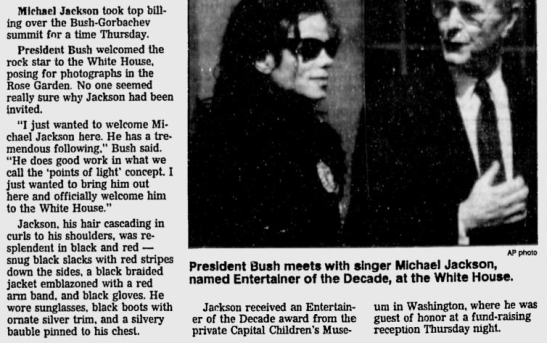
USSR April 6 1990: the Deep State calls in its premier spook for a briefing.
“As a result of a deliberate racist campaign, we are now being called SPID (SPID is a Russian abbreviation for AIDS) on the streets by Soviet youngsters.” Soviet street folklore, with its characteristic sexual undertone, tied together the much professed (and mocked) “love” of the Soviet officialdom for the developing world and the appearance of the disease in Russia. A popular joke provided “alternative” transliterations for the original Russian SPID (AIDS) wherein the term was variously interpreted either as Sotsialnoe Posledstvie Internatsionalnoj Druzby (Social Consequence of International Friendship) or Spetsialny Podarok Inostrannyh Druzej (Special Gift from Foreign Friends). Africans residing in the Soviet Union were far from amused though; the joke encapsulated growing popular dissatisfaction with the regime, which “wasted precious resources” on people who (in the words of one populist politician) “have just descended from the palm tree.”
[…]
While the Soviet-style paternalism, that permeated the pre-perestroika publications on Africa, was being gradually toned down, so was the concern for the continent. Africans residing in Russia on the eve of the Soviet collapse noted on many occasions that coverage of Africa was reduced to simplistic and highly stereotypical catalogues of its bane and woes. In the media, the very word “Africa” was often supplanted by cherny kontinent (black continent), the place of danger and wasted opportunities, and a proverbial black hole devouring scant Soviet resources. The stage was being set for the Soviet Union’s withdrawal from Africa as it was for the debilitating wave of racism and xenophobia soon to sweep across the post-Soviet spaces.6
But, seriously, Russia – why import blacks in the first place? Everybody knows the Russians invented breakdancing:
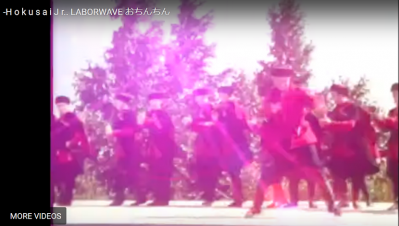 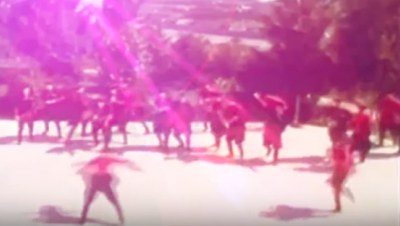
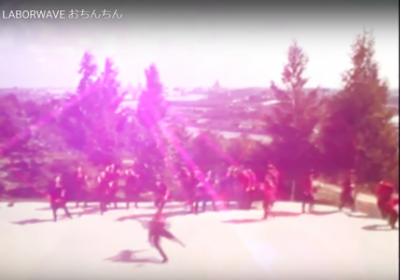 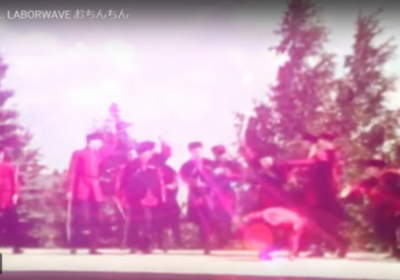
Not sure that these dancers doing an early form of break-dancing, viz., “the labor wave”, are exactly Russian and can therefore be attributed as the inventors; however, it is Soviet era and they are wearing Russian style hats.
Endnotes:
Carew, Joy Gleason. Blacks, Reds, and Russians: Sojourners in Search of the Soviet Promise. New Brunswick, NJ: Rutgers University Press, 2010, p. 52.
Robeson, Paul. Here I Stand. Boston, MA: Beacon Press, 1988, p. 38.
Mitchell, Nancy. Jimmy Carter in Africa: Race and the Cold War. Washington, DC: Woodrow Wilson Center Press, 2016, p. 243.
Matusevich, Maxim. “Probing the Limits of Internationalism: African Students Confront Soviet Ritual”. Anthropology of East Europe Review (Fall 2009), pp. 21-24.
Nyangira, Nicholas. “Student: Russians Hate Negroes”. Sumter Daily Item (April 16, 1965), p. 3.
Matusevich, Maxim. “Probing the Limits of Internationalism: African Students Confront Soviet Ritual”. Anthropology of East Europe Review (Fall 2009), pp. 30-31.
Comments:
icareviews, March 8, 2018:
I’ve read that Russia hosts a lot of North Korean guest workers, as well.
I’ve also heard before that Russian nationalists anti-immigration activists hate Putin. Who is the alternative in Russia for voters of populist-nativist inclination? The Communist Party? One sometimes hears of stirring “red-brown” tendencies in Russian politics – commies allying with hardline nationalists – and I think that was a particular fear of the internationalists during Yeltsin’s early years in office – but they just don’t seem to have any opposition parties with sufficient support to dislodge the Putin machine. For decades now, their most famous nationalist politician has been a Jewish clown named Vladimir Zhirinovsky. His whole shtick seems to be to make nationalism into an Archie Bunker type side show.
bob saffron, March 8, 2018:
Artemov maintains Lebed’s death was more than just misadventure.
http://www.theoccidentalobserver.net/2012/04/24/russians-in-russia-the-state-within-the-state/
bob saffron, March 8, 2018:
Putin I view positively only in comparison to the giddy imperialism of Washington. Taken with the obligatory grain of salt that comes with partial sources:
https://www.aljazeera.com/indepth/features/2017/11/death-russian-171123102640298.html
Next entry: Family retreat into the nature of Sweden
Previous entry: West Virginia teachers “make history” with implicit White unionization against state government
|

Posted by Leonid Brezhnev on Wed, 11 Apr 2018 05:10 | #
Nixon, “Now” more than ever…